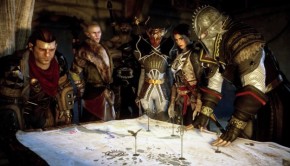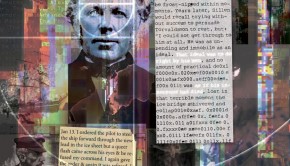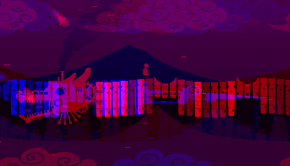Love Week: Christine Love Interview
We spoke to Christine Love about her most influential games, sandbox visual novels, and the true horror of the patriarchy. Before reading, be aware that Analogue and Hate Plus are covered in-depth.
Gaming Intelligence Agency: So what led you to choose visual novels or interactive fiction as your chosen storytelling medium?
Christine Love, game author: Well, I always started out as a novelist, and I discovered visual novels and I was so drawn to them. It’s all the power of prose of a novel, but you can marry that with the imaginative power of visuals and the emotional strength of music and just the all the power of interactivity to really draw the player in. That really appealed to me a lot, so I started playing around with that.
 GIA: What games were those that kind of got you into the visual novel/interactive thing?
GIA: What games were those that kind of got you into the visual novel/interactive thing?
Love: What really caught my attention was some stuff coming from the Japanese doujin scene, like Collage and Narcissu.
GIA: I don’t think I’ve heard of those… I mainly know the big mainstream visual novels that are kind of weird.
Love: I’m not really a huge fan of a lot of the really big commercial stuff, personally.
GIA: Yeah, I could kind of gather that from the lyrics to the intro theme to Hate Plus.
Love: Hah, yeah.
GIA: What were the two games you mentioned like?
Love: They’re just really interesting, really sincere stories, that aren’t necessarily high-budget but… just really, actually speak to people.
GIA: And those were doujin games, kind of published independently, the same way you are.
Love: Yep, yep, exactly.
GIA: So did those, as opposed to more mainstream things, make you think that, “Oh, this is easy, I could do this myself?”
Love: Yeah, it was just those that got my attention as showing what the medium could do.
 GIA: I’ve played almost all of your games, I think, and they all have this thing where the interface ties heavily into the story. For instance, dialing numbers manually in Digital; or the conversation options in Analogue, which are given to you by your conversation partners; or the cursor in Even Cowgirls Bleed. The interface is always part of the story. Is pushing that envelope a goal of yours when you do a new game?
GIA: I’ve played almost all of your games, I think, and they all have this thing where the interface ties heavily into the story. For instance, dialing numbers manually in Digital; or the conversation options in Analogue, which are given to you by your conversation partners; or the cursor in Even Cowgirls Bleed. The interface is always part of the story. Is pushing that envelope a goal of yours when you do a new game?
Love: I think it just really brings the player into the story. These are games set in computers, so naturally I just run with that as much as I can. I actually come from a web design background, so I figure I always start with the UI, because that’s what the player’s going to be seeing for the entire game. So I feel like it’s very important to get that right, because it sets the tone, it sets the stage. This is going to be the way they interact with the story, and that’s the most important thing.
GIA: Analogue and Hate Plus are kind of unusual in that they’re some of the only commercially available visual novels that are created in the West. Are there any that I don’t know about or I should be looking into, or it just a completely untapped market?
Love: There’s a lot of people doing really great stuff, and I’m not going to name any of them, because I’m going to miss a bunch of people. But definitely there is some very interesting stuff being made in the West right now; we’re starting to see people really start to push forward.
GIA: Do you think there’s much audience overlap between your games and the doujin or well-known visual novels from Japan?
Love: Most of my audience have never heard of visual novels or read visual novels because they’re just not a big thing in the West. So I don’t try to target visual novel fans, and just target people who are interested in neat stories.
 GIA: On to game-specific stuff, I wanted to talk about what an appalling teacher the guy from Don’t Take It Personally is.
GIA: On to game-specific stuff, I wanted to talk about what an appalling teacher the guy from Don’t Take It Personally is.
Love: Hah. He’s pretty bad.
GIA: I thought the title of that was interesting because, it’s not your story, but everything centers around him. Saying “it’s not your story” is kind of to the player more than to the character, since you have almost no control over what he does or what happens in the story. It’s not a traditional visual novel, where when there’s a dialogue option, you actually have some agency over what your avatar does. But I kept saying “no, no please don’t go there,” and yet…
Love: Well, no, you get the option to say no! There’s always… for all the terrible things, you can play it mostly straight. He’s always inept, but there’s always a choice.
GIA: Then there’s Hate Plus, though, which is a pretty pushy game.
Love: [laughs]
GIA: It really wants you to do things exactly its way, it kind of guilts you into playing along with things like the 12-hour time limit or the cake sequence. But there are carrots, too, with the achievements for doing both things. Do you think that helps the more demanding bits of the game go down better?
Love: I mostly just want to make an experience that’s interesting for people… I don’t really have any measures to prevent the time skip thing. Like, there’s even a code in there that lets you skip it, and I put that in intentionally because I don’t want people to feel like they’re forced to. It’s just how I think the game would be better played.
GIA: I like that the game kind of wants you to, but there’s also a reward for doing it right.
Love: Yeah. I think that’s all it can be. “I think you should do this, and if not, well, that’s fine.” *Hyun-ae might judge you, but I don’t really. I get it.
GIA: Do you think people would be as willing to play along if there was only the reward and no pushback from the game? Like, instead of the timer counting down, “Come back in 12 hours and we’ll talk again!”
 Love: I don’t know. Hate Plus was very experimental in that regard. I was just trying to see what would work. Like, the whole cake scene, I had no idea if that was something that would make sense or if people would just scoff at it. It turns out, yes, people are definitely interested in doing that, so…
Love: I don’t know. Hate Plus was very experimental in that regard. I was just trying to see what would work. Like, the whole cake scene, I had no idea if that was something that would make sense or if people would just scoff at it. It turns out, yes, people are definitely interested in doing that, so…
GIA: You’ve gotten a pretty good response to that, from the emails so far?
Love: So far, five hundred people have baked cakes and sent me pictures, so yeah.
GIA: You have the sales and the people on Twitter, but seeing people put that much dedication into it…
Love: That is the biggest measure of success I have. The idea that my works have touched people so much that they feel willing to go to such lengths for it is… I think it says more than anything else.
GIA: I noticed that Hate Plus is a bit more railroady than Analogue when it comes to ensuring that the player sees everything, gets every log. Did you find that a lot of people were missing content in Analogue by triggering the endgame too early?
Love: No, not really. Honestly, for Hate Plus, I wanted to make it as not railroady as possible. It’s very open-ended. You can go through everything in any order you want, you don’t need to figure out the logic of what to show to the AIs. It’s not the AIs forcing their version of the story onto you, you go through and figure it all out yourself. I think it really is kind of like a sandbox visual novel. You create your own story, and I’m just leaving the pieces there for you.
 GIA: I’m curious, where did the character Eun-a come from?
GIA: I’m curious, where did the character Eun-a come from?
Love: Let me tell you, a real dark place. Oh, she makes me very, very uncomfortable. Her head was not a nice place to be in for several months. Really, I think the recurring theme of Analogue is that the worst misogynists are always women, because that’s the greatest trick patriarchy can play, is convincing us to self-perpetuate our own oppression. So I felt like it absolutely had to be a well-educated woman pushing all this, because that’s just…
GIA: That’s about the most nightmarish scenario you can have.
Love: Yeah, and it’s also a pretty realistic one. We have gotten to be very good at self-policing.
GIA: She reminded me of real people like Beverly LaHaye, who runs the Concerned Women for America, this huge anti-woman group. It’s like, what are you doing?
Love: Yeahhh… It’s distressingly common.
GIA: It really was depressing in a way that seeing Emperor Ryu’s thoughts wouldn’t have been.
Love: Yeah, no, he just likes power. I felt like, I don’t want to make it just an evil mustache-twirling man who wants to oppress women. That’s not how patriarchy works; it’s much more insidious than that.
 GIA: On *Hyun-ae’s side, she makes a comment toward the end of Day 3 about how she could sympathize with Eun-a because she felt they were both trapped people trying to right themselves. It’s kind of left unsaid that both of them only got what they wanted at the expense of everybody else on the ship.
GIA: On *Hyun-ae’s side, she makes a comment toward the end of Day 3 about how she could sympathize with Eun-a because she felt they were both trapped people trying to right themselves. It’s kind of left unsaid that both of them only got what they wanted at the expense of everybody else on the ship.
Love: Definitely.
GIA: Is that an intentional thing? Are you supposed to think about exactly what these people have in common?
Love: She just empathizes, is all. *Hyun-ae is a very traumatized little girl who is pulled into a horrible situation. Eun-a has less of an excuse.
GIA: On the other route, *Mute goes to through a dramatic shift and is reborn. After I read through her an account in Block M13 of her first days with Eun-a, I felt really wary of some of the dialogue choices I got, because I was being put in the same position of, “Oh, now I get to reshape the security lady!”
Love: That was it exactly! I hope the player does feel uncomfortable about that. Because a lot of the speculation before Hate Plus came out was that *Mute was programmed to be this way or brainwashed, but no. She was just…
GIA: Raised that way, basically.
Love: Yeah. That what was she was told was normal. And obviously, I think the attitudes were reprehensible, but that’s just what she was taught was normal.
GIA: So *Mute gets that from Eun-a, because in the last ten years, things have developed that way to be the new normal. But where would someone like Eun-a get that from? What was she drawing on to get this image in her mind of how femininity should be?
 Love: Well, she’s a scholar, she reads lots of Neo-Confucian texts and thinks back to a simpler age. You know, when things weren’t so complicated. And this is a recurring thing, we have always thought that the past was a simpler age. This is what the Joseon Dynasty was in fact founded on. It was the exact same thing, it was people going, “Oh, our modern society”—in their case, it was a Buddhist society—they thought, “This is so modern and immoral. Let’s go back to the good old traditions.” And they then proceeded to invent a whole bunch of shit and proclaim that it was traditional.
Love: Well, she’s a scholar, she reads lots of Neo-Confucian texts and thinks back to a simpler age. You know, when things weren’t so complicated. And this is a recurring thing, we have always thought that the past was a simpler age. This is what the Joseon Dynasty was in fact founded on. It was the exact same thing, it was people going, “Oh, our modern society”—in their case, it was a Buddhist society—they thought, “This is so modern and immoral. Let’s go back to the good old traditions.” And they then proceeded to invent a whole bunch of shit and proclaim that it was traditional.
I’ve talked to a lot of people who… I feel she’s a very easy-to-understand character, because the way she talks is just straight-up pulled from some of the more conservative friends I’ve had in the past, who would honestly say things like this and really believe that modern society is so much worse and everything was so peachy keen back in the 50s.
GIA: How did you get on to the idea of using the Joseon Dynasty?
Love: It was just studying history. Studying Korean history, it just caught my attention for being this sudden shift from a more egalitarian society… [pre-Joseon] Korea wasn’t perfect or anything, it was still very inequal and very sexist by modern standards, but it just became incredibly regressive as the Joseon Dynasty was founded, and that really caught my attention.
GIA: I kind of got the sense that on the Mugunghwa too, with the story of Jin-a and Ae-jeong, between them and Seung-bok and Mimi, that things really were more egalitarian in the “barbaric” days.
Love: Yeah, it’s starting from a modern society—what we’d consider modern and progressive, others would consider to be barbaric.
GIA: The Meritocracy and Unity Acts were the big ominous pieces of legislation that really drive the plot, but it seemed like that the thing that had the most effect on everyone’s lives was the Motherhood Credit Act.
 Love: Of course. It always comes back to the economics of it all. That’s what matters most. You create these systems that end up perpetuating certain underlying assumptions.
Love: Of course. It always comes back to the economics of it all. That’s what matters most. You create these systems that end up perpetuating certain underlying assumptions.
GIA: Yeah, all the minor characters that didn’t have anything to do with the power struggle between Old *Mute and Emperor Ryu, it really wrecked all of their lives.
Love: Yeah. And I mean… fundamentally, marriage is about economics. We like to pretend right now, in modern times, that it is about love being more important than all things. But when you actually start to talk about marriage—in the United States, you talk about providing health insurance for your partner or the different tax benefits you get from declaring joint income. Even in that case, it’s about economics.
GIA: Is that one of the things that you wanted to play up by having the game start with either *Hyun-ae or *Mute as your AI “Bride”? Are you supposed to question what a “bride” means in this context?
Love: Right, exactly. It’s also this internalized assumption that women can only relate to their fathers or their husbands. This is just the way *Mute thinks—she cannot envision a relationship with a man that is not one of these two.
Thanks to Christine Love for her time during PAX 2013 and for being patient as we mangled the pronunciation of every single name in the game.










